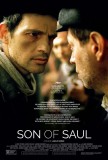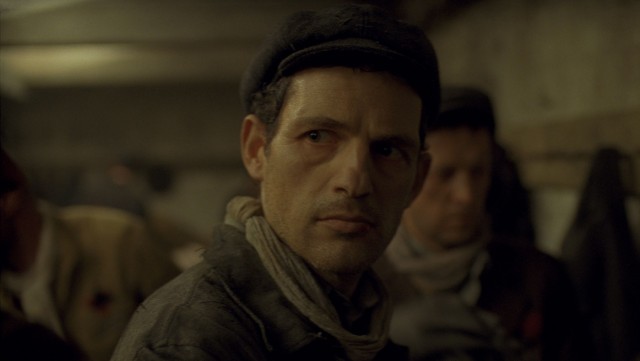Son of Saul Movie Review
 |
Son of Saul (Saul Fia)
US Theatrical Release: December 18, 2015 (Hungarian: June 11, 2015) / Running Time: 107 Minutes / Rating: R Director: László Nemes / Writers: Clara Royer, László Nemes Cast: Géza Röhrig (Saul Ausländer), Levente Molnár (Abrahám Warszawski), Urs Rechn (Oberkapo Biederman), Todd Charmont (Bearded Man), Sándor Zsótér (Doctor Miklos Nyiszli), Marcin Czarnik (Feigenbaum), Jerzy Walczak (Sonderkommando Rabbi Frankel), Uwe Lauer (SS Voss), Christian Harting (SS Busch), Kamil Dobrowolski (Mietek), Amitai Kedar (Hirsch), István Pion (Katz), Juli Jakab (Ella), Levente Orbán (Vassili), Gergö Farkas (Saul's Son), Balázs Farkas (Saul's Son) |
The Academy of Motion Picture Arts and Science has a long history of recognizing films about the Holocaust. That is only part of the reason that Hungary's official submission for this year's Foreign Language Film Oscar, Son of Saul, has emerged as the category's frontrunner and was the only non-English film with a snowball's chance in Hell of cracking 2015's field of Best Picture nominees.
The feature debut of director László Nemes, who co-wrote the original screenplay with Clara Royle, Saul focuses on Saul Ausländer (Géza Röhrig), a Hungarian Jew who has been assigned to work among the Sonderkommando, These atrocities occur out of focus, while the camera remains fixed on Saul, the quiet, seemingly emotionless man you know is not entirely desensitized by this position. Saul seems to flinch just a tiny bit at the sight of a doctor examining a young boy who narrowly survived the lethal gas. The doctor finishes him off and then orders an autopsy. Saul brings the body back and asks the doctor not to cut him open, a well-known violation of Jewish tradition. He tells the doctor (Sándor Zsótér), a fellow Hungarian, the deceased is his son, a claim whose veracity is left uncertain to us.
Nonetheless, the doctor promises to do what he can and Saul vows to take whatever desperate measures he can to get this adolescent boy the proper Jewish burial he deserves in lieu of the mass cremation other gas chamber victims receive. The remainder of the film follows Saul on that perilous mission, as he looks for a rabbi who can recite the Kaddish and oversee the burial.
As should be perfectly clear by now, Son of Saul is one bleak movie. Most of us have seen the Holocaust dramatized elsewhere, whether in Schindler's List, The Pianist, or no shortage of European films. Nemes, who is not yet 40, makes a confident and distinctive debut, creatively utilizing the long-outmoded 1.37:1 aspect ratio and selective camera focus. But it is a difficult film to get through once and one you may well never wish to endure again. Without having yet seen any of the other four nominees, I can only assume that this Holocaust tale will prove too harrowing and heartbreaking for that Foreign Language Film Oscar to go anywhere else.
|
Related Reviews:
DVDizzy.com | DVD and Blu-ray Reviews | New and Upcoming DVD & Blu-ray Schedule | Upcoming Cover Art | Search This Site
DVDizzy.com Top Stories:
Oscar Nominees: Spotlight • The Revenant • The Big Short • The Hateful Eight • Joy • Steve Jobs
Holocaust: The Boy in the Striped Pajamas • Woman in Gold • The Counterfeiters
Past Foreign Language Film Oscar Contenders: Amour • Leviathan • Wild Tales • The Great Beauty • Kon-Tiki
Text copyright 2016 DVDizzy.com. Images copyright 2015 Sony Pictures Classics,
Unauthorized reproduction prohibited.
